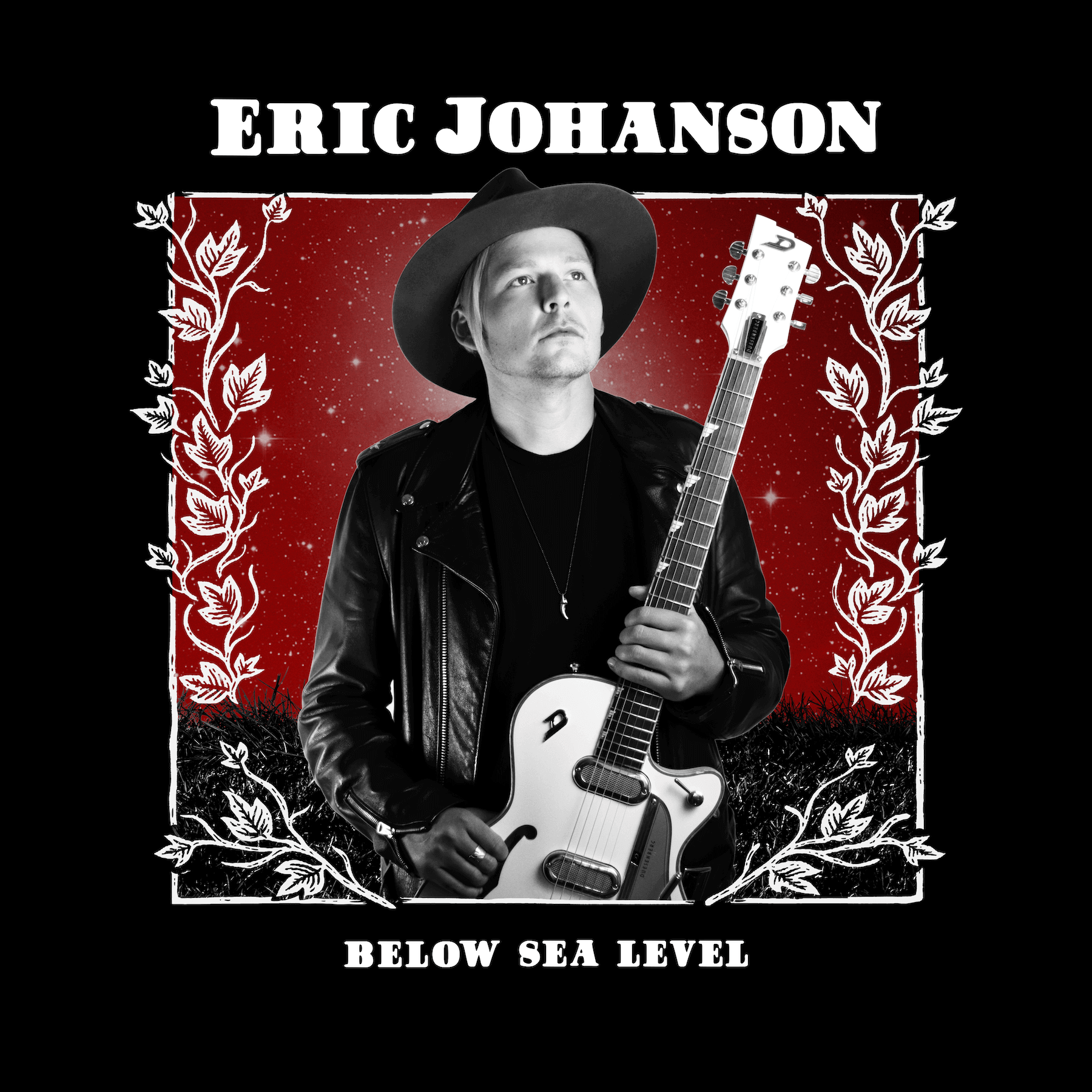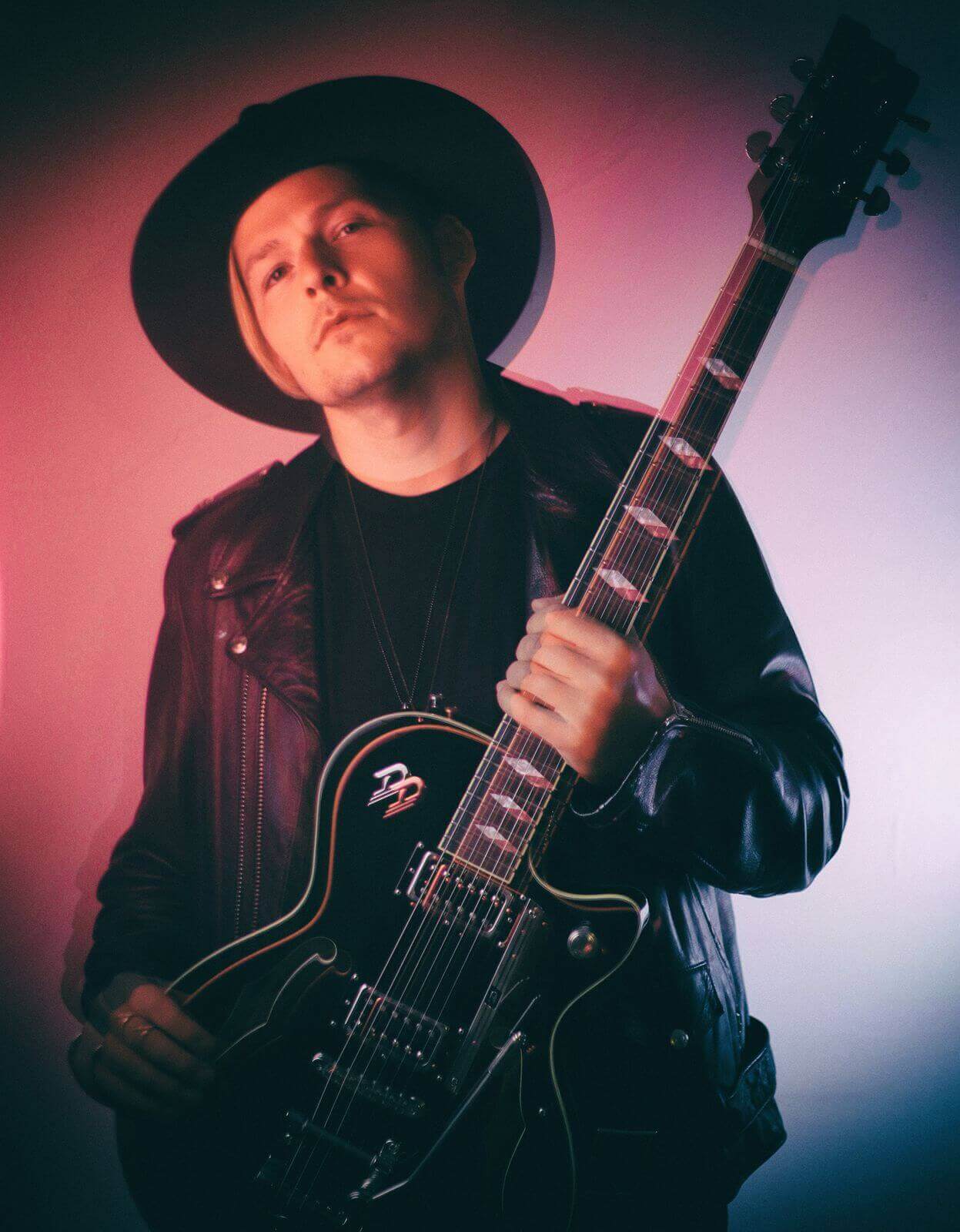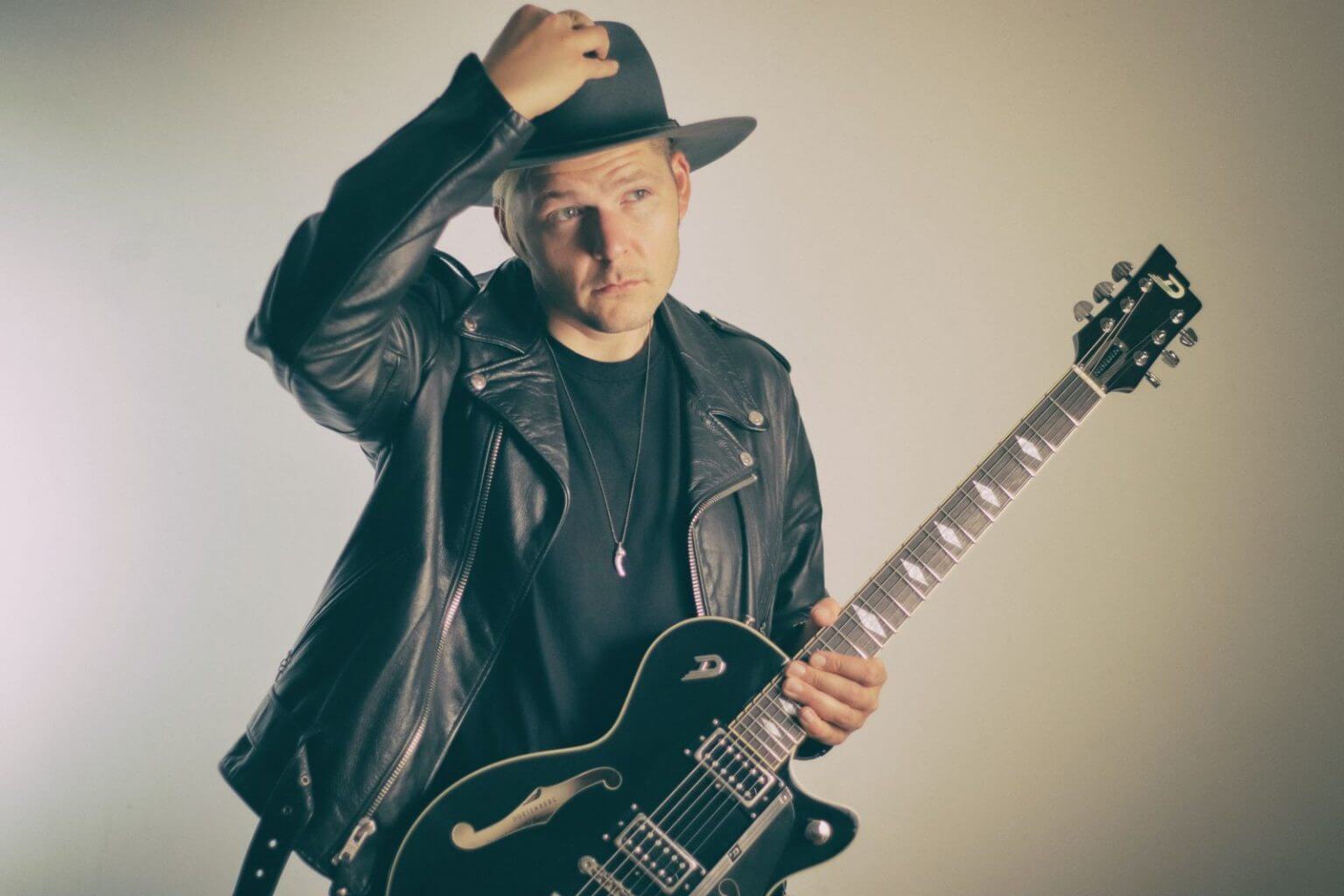Singer/guitarist Eric Johanson is a proud resident of New Orleans. So much so that he named his sophomore solo album, Below Sea Level, after the city’s elevation. Or lack thereof.

“There’s no guarantee of this place being as it is right now forever,” he says of his city. “Of course, we hope it will be. But I think there’s a certain appreciation of the moment and you know, New Orleans.”
Below Sea Level, produced by Luther and Cody Dickinson, is muscular blues rock with a thoughtful quality. Johanson’s textured voice has an emotional depth and his guitar playing, while impressive, is just as emotive. So while his music doesn’t necessarily scream New Orleans funk and jazz, the influence is there. “There’s a certain beautiful brokenness to the city,” he says. “There’s a lot of history here. And so there’s a lot of buildings that have been here many years and a lot of our pavement is very cracked and moved around by the tree roots beneath it, and there’s a certain living, breathing quality, that is kind of all around you here, whether it’s music or the fact that it’s these huge oak trees.”
Like so many artists releasing an album in 2020, Johanson is trying to figure out how to promote it without playing in-person live shows. For him, that means a weekly livestream, where he can connect with fans. Johanson learned the importance of fans from his mentor, singer/guitarist Tab Benoit. “He could go out there and talk to a crowd for 20 minutes,” Johanson recalls. “That’s a big thing that he was always telling me: you don’t want them to like one song; you want them to get to know you, who you are. That’s a relationship that’s going to last, if they really get to know you. So that kind of has stuck with me.”
Johanson appreciates the connection, not only because he’s trying to build his fan base, but also because of how it lets him talk to fans in a way that isn’t always possible in a club. “I think that there used to be this idea in musicians’ heads that in order to get successful you needed to seem like you were on a pedestal or something, he says. “But these days, people want to connect with the artists directly. They’re not looking for a slick presentation all the time. They’re more interested in just seeing you unfiltered. And so that gives you an opportunity to really feel like you’re getting to know people.”
Johanson isn’t out and about the way he was before COVID, nor is New Orleans open in the same way, but he’s still finding fans, aided by an album that features some North Mississippi-style grooves, and, of course, Johanson’s powerful vocals and guitar work. Like New Orleans, it will keep you focused in the moment.

Steven Ovadia for American Blues Scene:
What was it like working with the Dickinson brothers?
Eric Johanson:
Really relaxed and fun. Luther’s just a relaxing person to be around. He’s really upbeat. And I obviously am a big fan of his and in certain instances that can be intimidating, when you’re a big fan of somebody’s playing and all the work that they’ve done, but he’s such a nice guy and he was so into the music and everything, that that it really put me at ease.
I sent demos to Cody before we got in the studio and he had learned all the music and even had little ideas on songs already. So it was it was really, really inspiring to work with them. They have great energy.
How hands-on were they?
This was actually recorded in late February, but we had been trying to line up our schedules for at least almost like half a year. So we finally found a good, long weekend that we could work. I knew that we had to get in there and basically be ready to tweak the songs, but we weren’t going to have time to start from scratch or anything like that. So I fleshed out everything with pre-production drum machine type of demos and sent that to them and got feedback.
When we got in the studio, Luther let us do the songs as they were on the demo, for the most part, and then he might suggest, ‘Maybe it doesn’t need to do that again here’ or just different suggestions. I’d be doing guitar solos and he would just kind of help me stay in the zone, maybe not play too much. Stuff like that. So really integral to the process. There was a lot of pre-production and the demo of the album sounded very similar, in terms of song structure and everything.
Was it literally three days in the studio?
Yeah, three total, 15-hour plus days in studio. I got there on a Thursday night, I think, and we spent all of Friday, Saturday and Sunday, from morning to night, in the studio and did it all within that time period.
Do you have any idea how they’re both so prolific? Because I feel like 70% of what I listened to, at least one of them played on or produced. Are they just like always doing things? Are they multitasking ?
Yeah, I feel like they both stay in motion a lot. I hung out with Luther when he came down to play a charity event with Anders Osborne and I picked Luther up at the airport. This was a couple of months before we recorded. We talked music as we had lunch and we went to the charity event, we’re talking about the album while he’s getting set up to do this charity thing with Anders. So I think they’re just kind of used to hatching plans while on the go, on the way to a gig or, or whatever it is.
They just have a really good energy and I think they both operate from an instinctive perspective, which is what I’ve been moving more toward recently in my life: the just-go-with-your gut instinct. Rather than obsessing or overthinking or thinking that every little detail needs to be meticulously planned, just go with what what you feel and say ‘Yes, that’s the one. Let’s take it.’ You know, keep rolling.
What does the over-thinking look like for you?
In the past, it’s been a challenge for me to figure out how to do roots and blues-based music that I love to play. If you try to write too much into the music, and you try to make it too complicated. It really loses what’s great about blues music; it loses that simplicity. But at the same time, you don’t want to feel like you’re just writing lyrics to a tried and true pattern that everyone’s already played exactly the same way. So it’s sort of trying to find that balance and not overly write things, but at the same time, keep them fresh.
So I’ve tried to, to operate more from an instinctive perspective. When I’m writing now, I’ll start with just humming a melody in the phone or something and see where that leads me.
The big challenge of this kind of music is that the structures are firm. If you change them too much, it becomes something else. How are you keeping it fresh?
That’s something that I’ve thought a lot about. This is my second album under my own name, sort of within the blues genre. And neither album really has much in the way of a traditional I-IV-V type structure. I think this one [Below Sea Level] has a couple of things that maybe follow a traditional structure but, I’ve always felt like the blues is a feeling and it’s not necessarily a pattern.
A lot of the earlier Delta blues, there’s a lot of variation in there in terms of when they change chords, or how they approach it. And I think that a lot of blues bands, maybe more inspired by, like, Chicago blues or the Texas blues of the 80s and 90s, started to fall into this pattern of every song is one of these sort of drop-down list of variations. So I guess in a way, I’m not specifically concerned to keep things within those patterns. But I think in songs like, “Buried Above Ground” or “Down to the Bottom,” where they’re not traditional blues patterns, but they incorporate Delta ideas, like mimicking the guitar line and the voice, which is something that you might hear Son House or Mississippi Fred McDowell do. I just tried to draw more on the spirit of the expression and less on the pattern.
Sort of related to the idea of the patterns and the structure, the grooves had a very traditional North Mississippi sound. Did that come from you or from working with the Dickinsons?
I think both. Like I said, the songs, if you were to listen to the pre-production demos, were pretty much the same songs, but I was definitely thinking of Cody and Luther with some of them, where I was like, ‘I want to do one of those really up-tempo songs that that I’ve heard Junior Kimbrough or North Missisippi All Stars do.’ Like the song “Nowhere to Go,” which is the fastest song I’ve ever recorded. It’s something like 240-something BPM. It’s a fast, uptempo song and I just I love that energy. So I was definitely thinking of that type vibe and wanting to get that type vibe.
The song “Open Hearted Woman” has a Junior Kimbrough type of groove to it. So I kind of geared things in that direction, knowing that Cody would jump on the drums and just know exactly where I was coming from and make it authentic and perfect for what it should be. So it’s kind of a combination. It’s one thing to sketch out songs like that, but the devil’s in the details. The execution of it is everything because if you get the groove just right, then it has this magical thing. Otherwise, it might just be a simple song that sounds really fast, you know?
I was really impressed by your slide playing. Is that a love of yours?
Thank you so much. Slide guitar is so expressive. And I’ve been playing slide now for quite some time, but it’s still one of those things that just inspires you because it has such a vocal quality to it, and you really get all of these microtonal things when you’re playing slide. In other words in between the notes of the standard chromatic, Western scale. So just as a good singer does things with their voice that is not necessarily directly falling on one of the piano keys on the keyboard, it’s the same thing with slide. There’s all these little inflections that you you can do that are not quite one note or the next note. It’s somewhere in-between. And to me that, that just opens up this whole world of expressing yourself. I really love playing slide and listening to people like Luther. He’s one of my favorite slide players out there.
What did you learn working with Tab Benoit?
Working with Tab was not was not only a great experience for me, he really gave me an opportunity that not many people get to have. And it’s something that he’s never done for anyone else. He took me out on the road for maybe a little over two years. I was opening most of his shows and I was also helping with some aspects of the business. And so I was able to learn by seeing him perform, how he related to the crowd. Many nights of hanging out with him and, and him giving me advice about different things. And I was also able to get introduced to his crowd every night, which was something that is priceless, to get to connect with hundreds of fans of blues rock music. So I learned a lot from Tab. He’s a very stripped-down, natural kind of player. He not big into rehearsal. He’s not big into anything that takes too much overthinking. He’s a very gut instinct type of player.
And what was the what was the business stuff Tab had you working on?
I was acting as his tour manager for a little while. When you’re on the road, and every person needs a hotel room and there’s only so many bunks on the bus, and a lot of times the support act budgets are not huge. So, trailing behind the bus, in a van of your own and gassing it up and and trying to provide rooms for your own band…a lot of times that’s done at a loss for opening bands, for the opportunity. And for me, not having any sort of financial backing and not from a family with money or anything like that, the idea of running at a loss for any period of time, is not really feasible. So he gave me the opportunity to get on board and manage his tours.
And he backed me up on drums every night. He played drums for me and his bass player, Corey Duplechin, played bass for me. It was very cool, because I don’t know how many times that’s ever been done, where people go to see one of their favorite guitar players and singers, like Tab, and he comes out on the mic before the opening band and says, ‘Hey, I want you to check out this artist. I’m going to play drums for him.’ That’s an amazing way of being presented to someone’s audience. And it was very deep. And he’s great drummer. I mean, he’s actually really fun to play with. He’s one of my favorite drummers that I’ve played with. But he played drums on my record, ‘Burn It Down.’ So people can hear hear his drumming on that record as well.
Were you just exhausted? Being a tour managers is a full time job in itself, and then also playing the show?
You know, it was exciting. I’d be lying if I didn’t say it was extremely full-on. I would hop off the stage after playing the encore of his set. He’d always bring me back out and I’d play with him. And I would run out to the lobby, whatever back way I could. Sometimes I’d go out the back door and run out to the front to try to make it to the merch table and meet fans for a while, and then I would go back to the stage and start seeing things get packed out and handling the business side. Settling up money and stuff like that. I’ll say this: it was really instructive and informative to me to handle the business of someone that was a few steps above where I’m at in the business, because that helps you to see how things run, and the ins and outs of a world that you’re probably not going to see as an opening band. You’re not going to know how the ticketing works and how the bonus points work and all of that sort of thing.
When I ended up doing some of my own tours in between his tours, the band members that were playing with me were just saying, ‘Wow, this is really organized.’ Yeah! Cause my tour is way easier. It was really almost like a crash course then, in running efficient tours as well. And I think I was able to to also bring some ideas to the table and tighten some things up. It was very cool and I still consider Tab and all those guys family.


